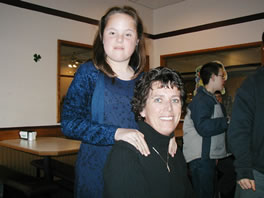Intimacy
and Sexuality
 In
general, individuals with Down syndrome reach puberty and sexual maturation about
the same time as their non-disabled peers. However, adolescent girls with Down
syndrome who have hypothyroidism, or a history of heart disease, are more likely
to have delayed onset of puberty. Most young women with Down syndrome have regular
menses after menstruation occurs. Up to 40% of the young women with Down syndrome
have a normal ovulation pattern, while 30% ovulate on a less predictable cycle.
Young women with Down syndrome can become pregnant and at least 1/3 of their children
will have Down syndrome. Men with Down syndrome are quite often infertile.
In
general, individuals with Down syndrome reach puberty and sexual maturation about
the same time as their non-disabled peers. However, adolescent girls with Down
syndrome who have hypothyroidism, or a history of heart disease, are more likely
to have delayed onset of puberty. Most young women with Down syndrome have regular
menses after menstruation occurs. Up to 40% of the young women with Down syndrome
have a normal ovulation pattern, while 30% ovulate on a less predictable cycle.
Young women with Down syndrome can become pregnant and at least 1/3 of their children
will have Down syndrome. Men with Down syndrome are quite often infertile.
 Teens
with Down syndrome today enjoy many of the same community activities as their
typically-developing peers. In this environment, there is an increased opportunity
for intimacy and sexual relationships. Teens with Down syndrome need accurate
information about intimacy and sexuality, presented in an open manner that is
comprehensible and relevant for the individual. Adolescents with Down syndrome
need the same type of information as their non-disabled peers about issues such
as conception, contraception, sexually-transmitted disease, and sexual abuse.
However, it’s important to tailor the information to the learning style
of the teen with disabilities, to factor in the values and wishes of the parents,
and to allow opportunity for questioning and open discussion. Within the limitations
and context of the teen’s living arrangement, decisions need to be made
about the extent of intimate relationships.
Teens
with Down syndrome today enjoy many of the same community activities as their
typically-developing peers. In this environment, there is an increased opportunity
for intimacy and sexual relationships. Teens with Down syndrome need accurate
information about intimacy and sexuality, presented in an open manner that is
comprehensible and relevant for the individual. Adolescents with Down syndrome
need the same type of information as their non-disabled peers about issues such
as conception, contraception, sexually-transmitted disease, and sexual abuse.
However, it’s important to tailor the information to the learning style
of the teen with disabilities, to factor in the values and wishes of the parents,
and to allow opportunity for questioning and open discussion. Within the limitations
and context of the teen’s living arrangement, decisions need to be made
about the extent of intimate relationships.
For
more on "Issues of Sexuality in Down Syndrome" please click here for
an article by Dr. Van Dyke.
RnCeus.com
 Teens
with Down syndrome today enjoy many of the same community activities as their
typically-developing peers. In this environment, there is an increased opportunity
for intimacy and sexual relationships. Teens with Down syndrome need accurate
information about intimacy and sexuality, presented in an open manner that is
comprehensible and relevant for the individual. Adolescents with Down syndrome
need the same type of information as their non-disabled peers about issues such
as conception, contraception, sexually-transmitted disease, and sexual abuse.
However, it’s important to tailor the information to the learning style
of the teen with disabilities, to factor in the values and wishes of the parents,
and to allow opportunity for questioning and open discussion. Within the limitations
and context of the teen’s living arrangement, decisions need to be made
about the extent of intimate relationships.
Teens
with Down syndrome today enjoy many of the same community activities as their
typically-developing peers. In this environment, there is an increased opportunity
for intimacy and sexual relationships. Teens with Down syndrome need accurate
information about intimacy and sexuality, presented in an open manner that is
comprehensible and relevant for the individual. Adolescents with Down syndrome
need the same type of information as their non-disabled peers about issues such
as conception, contraception, sexually-transmitted disease, and sexual abuse.
However, it’s important to tailor the information to the learning style
of the teen with disabilities, to factor in the values and wishes of the parents,
and to allow opportunity for questioning and open discussion. Within the limitations
and context of the teen’s living arrangement, decisions need to be made
about the extent of intimate relationships.  In
general, individuals with Down syndrome reach puberty and sexual maturation about
the same time as their non-disabled peers. However, adolescent girls with Down
syndrome who have hypothyroidism, or a history of heart disease, are more likely
to have delayed onset of puberty. Most young women with Down syndrome have regular
menses after menstruation occurs. Up to 40% of the young women with Down syndrome
have a normal ovulation pattern, while 30% ovulate on a less predictable cycle.
Young women with Down syndrome can become pregnant and at least 1/3 of their children
will have Down syndrome. Men with Down syndrome are quite often infertile.
In
general, individuals with Down syndrome reach puberty and sexual maturation about
the same time as their non-disabled peers. However, adolescent girls with Down
syndrome who have hypothyroidism, or a history of heart disease, are more likely
to have delayed onset of puberty. Most young women with Down syndrome have regular
menses after menstruation occurs. Up to 40% of the young women with Down syndrome
have a normal ovulation pattern, while 30% ovulate on a less predictable cycle.
Young women with Down syndrome can become pregnant and at least 1/3 of their children
will have Down syndrome. Men with Down syndrome are quite often infertile.